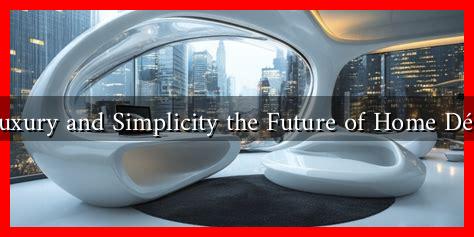-
Table of Contents
Is Luxury and Simplicity the Future of Home Décor?
In recent years, the world of home décor has witnessed a significant shift towards a blend of luxury and simplicity. As consumers become more discerning about their living spaces, the demand for designs that exude elegance while maintaining a sense of minimalism has surged. This article explores the emerging trend of luxury and simplicity in home décor, examining its implications for the future of interior design.
The Rise of Minimalism in Home Design
Minimalism, characterized by clean lines, uncluttered spaces, and a focus on functionality, has gained traction as a lifestyle choice. The philosophy behind minimalism is not just about reducing physical clutter but also about creating a serene environment that promotes mental clarity. According to a study by the National Association of Home Builders, 62% of homebuyers prefer open floor plans that emphasize simplicity and spaciousness.
Luxury Redefined: Quality Over Quantity
Luxury in home décor is no longer solely about opulence and extravagance. Today’s consumers are gravitating towards high-quality materials and craftsmanship that offer lasting value. This shift is evident in the following trends:
- Sustainable Materials: Eco-friendly materials such as reclaimed wood, bamboo, and recycled metals are becoming popular choices for luxury home décor. Brands like Bamboo Home are leading the way in offering sustainable yet stylish options.
- Artisanal Craftsmanship: Handcrafted items that showcase unique artistry are highly sought after. Consumers are willing to invest in pieces that tell a story and reflect their personal style.
- Smart Home Technology: Integrating technology into home design enhances convenience and efficiency, making luxury more accessible. Smart thermostats, lighting systems, and security features are now standard in high-end homes.
Case Studies: Brands Embracing Luxury and Simplicity
Several brands have successfully embraced the concept of luxury and simplicity in their offerings:
- Muji: This Japanese retailer is known for its minimalist design philosophy, offering a range of home goods that prioritize functionality and simplicity. Their products are designed to enhance everyday life without unnecessary embellishments.
- West Elm: A leader in modern furniture, West Elm focuses on sustainable materials and timeless designs. Their collections often feature clean lines and neutral palettes, appealing to consumers seeking both luxury and simplicity.
- Rove Concepts: This furniture brand combines Scandinavian design principles with high-quality materials, creating pieces that are both elegant and understated. Their commitment to craftsmanship aligns with the growing demand for luxury that is not ostentatious.
The Psychological Impact of Luxury and Simplicity
The interplay between luxury and simplicity also has psychological implications. Research indicates that a clutter-free environment can lead to reduced stress and increased productivity. A study published in the journal Environment and Behavior found that individuals in minimalist spaces reported higher levels of satisfaction and well-being. This connection between environment and mental health is driving consumers to seek homes that reflect a balance of luxury and simplicity.
Future Trends in Home Décor
As we look to the future, several trends are likely to shape the landscape of home décor:
- Personalization: Consumers will increasingly seek personalized designs that reflect their unique tastes and lifestyles, blending luxury with simplicity.
- Biophilic Design: Incorporating natural elements into home décor will continue to gain popularity, promoting a sense of tranquility and connection to nature.
- Smart and Sustainable Living: The integration of smart technology with sustainable practices will redefine luxury, making it synonymous with eco-conscious living.
Conclusion
The future of home décor is undoubtedly leaning towards a harmonious blend of luxury and simplicity. As consumers prioritize quality, sustainability, and mental well-being, designers and brands must adapt to these evolving preferences. By embracing minimalism while offering high-quality, personalized options, the home décor industry can cater to a new generation of homeowners who value both elegance and simplicity. This trend not only reflects changing consumer attitudes but also sets the stage for a more thoughtful and intentional approach to living spaces.

